#Tobit 1:1-2
Text
Your festivals shall be turned into mourning, and all your songs into lamentation
Daily Verse Reading – Tobit 1: 3; 2: 1-8
Tobit 1:3
Tobit’s Youth and Virtuous Life3 I, Tobit, walked in the ways of truth and righteousness all my life. I performed many acts of charity for my kindred and my people who had gone with me in exile to Nineveh in the land of the Assyrians.
Tobit 2:1-8
2 Then during the reign of Esar-haddon[a] I returned home, and my wife Anna and my son Tobias…

View On WordPress
0 notes
Note
You ever read the "apocrypha" books of the Bible? (like Maccabees 1 & 2, Judith, Tobit, Wisdom, etc?)
Judith is a very cool story if you haven't-
I have a book on it! I'll read it at some point when I'm less busy haha. I've read Susanna which is very fun and a little bit of Judith
122 notes
·
View notes
Text
Origin of the names of the angels
Since I have done a post on the origin of the names of the seven kingdoms of Hell, may as well do the origin of the names of the angels.
Warning, this post contains religious content. If you are not comfortable, please ignore this.
Now let's go on with our trivia post
Seraphim
Now I just want to make a distinction. The Seraphim irl are called "the Archangels", but that doesn't mean they belong to the rank of archangel, the second-to-lowest rank, it only means they are the leaders and chieftains of all the angels, including other Seraphim.
Also, Michael, Gabriel and Raphael are the only named angels in the Bible.
Michael
"Michael" means "Who is like unto God?" in Hebrew. In the Bible, Michael is described as "the great prince, who standeth for the children of thy people" (Daniel 12:1), the angel who disputed with the devil over the remains of Moses (Epistle of St. Jude verse 9), the leader of the heavenly army fighting against the dragon (Revelation 12:7).
In the Christian tradition, Michael is the leader of God's army fighting against Satan, helper of the faithful Christians at the moment of death, champion of God's people, protector of the Jews under of the Old Testament, and of God's Holy Church. He is also the patron of many chivalric order of knights.
Michael, having led the battle against Lucifer, is the greatest of all angels, no angel could surpass him in honor and glory.
The feast day of St. Michael in Western Christianity is held on September 29, commemorating the dedication of first church built in his honor in Western Europe. In Eastern Christianity, St. Michael and all angels have their commom feast day on the 8th of November.
Gabriel
"Gabriel" means "strength of God". In the Bible, he appears as the messenger of God who delivers messages of utmost importance: he tells the Prophet Daniel two prophecies concerning the successive empires and the time elapsing before the coming of Christ (Daniel chapter 8 & 9), he appears before Zachary and foretells that his son will be the Precursor of the Lord (Luke 1:5-25), and most importantly Gabriel announces to the Virgin Mary the Incarnation of the God the Son and that she is going to become the Mother of God (Luke 1:26-38). According to tradition, Gabriel was also the angel who appeared in St. Joseph's dream (Matthew 1:18-25; 2: 13-23), and also the angel who consoled Jesus (Luke 22:43). Thus, Gabriel is the Archangel of Incarnation and Consolation.
Some traditions have Gabriel as the angel of mercy while Michael is the angel of justice. Some others have it vice versa.
St. Gabriel's feast day, according to an old tradition, is on the 24th of March, the day before the feast of Annunciation.
Raphael
"Raphael" means "God has healed". The third Archangel appears only in the book of Tobit, in which he helps the young Tobias during his journey, ultimately aiding the young man heal his father's blindness and helping him find a good spouse. Therefore, Raphael is invoked as the angel of Healing and the Patron of finding a good partner for marriage.
Raphael was also the angel who revealed that there are seven Archangels. "For I am the angel Raphael, one of the seven, who stand before the Lord" (Tobit 12:15).
The feast day of St. Raphael, in old tradition, is on the 24th of October.
Cherubim
Selaphiel, Jegudiel and Barachiel
Selaphiel, Jegudiel and Barachiel aren't found in Sacred Scripture, but only in the tradition of Eastern Orthodox Church.
For these three angels, I have already made a post about it. I'll link it here for you guys.
Selaphiel, Jegudiel and Barachiel: Origin of the names
Zadkiel
Zadkiel does not appear in the Bible, although some identify him as the unnamed Angel of the Lord who prevents Abraham from sacrificing his son during the time that God tested Abraham (Genesis 22:1-18). It's the reason why if a church (usually an Anglican church) does depict Zadkiel in its iconography, he's depicted as holding a dagger, for Abraham intended to use a dagger to sacrifice his son.
We will skip over Thrones (or Ophanim), Dominions, Virtues and Powers because there is currently no angel of those choirs in-game yet.
Principalities
Michelleel
"Michelleel" is a name that PrettyBusy completely made up themselves. No angel is known with the name Micheleel. Micheleel is the combination of Michael written in another way "Michelle" and the suffix "el", which means "God".
Archangels
Rashiel, Armisael and Zeruel
Just like with Michelleel, these three Archangels have made up names by PrettyBusy.
Angels
Samael
"Samael" means "Venom/Poison of God". He exists only in Judaism's Talmudic lore. Sometimes he is considered a fallen angel, with some people think he's Satan, while other times he is considered the angel with destructive duties.
#prettybusy what in “hell” is bad?#what in “hell” is bad?#whb angels#whb michael#whb gabriel#whb raphael#whb selaphiel#whb jegudiel#whb barachiel#whb michelleel#whb leamas#whb trivia
63 notes
·
View notes
Note
my understanding of the apocrypha were most were recognized as canon by the Roman Catholic Church and other Orthodox Churches but as I'm trying to find more information online I'm getting more confused about what's considered canon by who (mostly the Roman Catholic Church as that is what I was raised in) do you have resources that clearly explain and/or list which denominations recognize which apocrypha?
So there’s a distinction to be made between what we on the show call capital-A Apocrypha and lower case-a apocrypha.
The capital-A type is also known as the Deuterocanon, and it represents the various late-era books that are present in the Greek translation of the Hebrew Scriptures called the Septuagint, but which are *not* included in the authoritative Hebrew text of the Bible known as the Masoretic text. (NB: the Septuagint is many centuries older than the Masoretic text.)
When Martin Luther translated the Bible into German, he separated these texts and put them at the end as being worthy of study but not as authoritative as the other material. Later American English editions of the Bible would subsequently cut the Apocrypha/Deuterocanon altogether to save on printing costs. So if you grew up in a Protestant church and don’t know what Bel and the Dragon is, that’s why.
These books include Tobit, Judith, and 1 and 2 Maccabees, among about a dozen others. You will find these in pretty much any Catholic Bible.
In addition, the Eastern Orthodox Church accepts a small handful more, including 3 and 4 Maccabees, 1 and 2 Esdras, and a bonus Psalm. If you buy a copy of a study version of the NRSV such as a NOAB or the new SBL study Bible, you should find that it contains all of the Deuterocanon of both the Catholic and Eastern Orthodox churches.
Where things start to get broader is in some of the Oriental Orthodox churches, most notably the Ethiopian Orthodox Tewahedo Church, which has over 80 books in its broader canon (numbers differ), including Jubilees and 1 Enoch.
Where the confusion comes, I think, is from the fact that the word apocrypha is also used to refer to works that were never part of any official canon despite their popularity and influence. Elements of these books have come into Catholic belief through tradition, however, even though they have never been official scripture. The Infancy Gospel of James is a major example of a book that has never been canon but which nevertheless has had an outsize influence on Catholic teaching.
Wikipedia has a chart that you may or may not find useful depicting which books are canon where
A short rule of thumb is this: the only Apocrypha considered canon by any church is Jewish in origin. There is no New Testament apocrypha held as canon by any major church
63 notes
·
View notes
Text
The List of 75 Books Lost or Excluded from the Bible
Joshua 10:13 KJV
And the sun stood still, and the moon stayed, until the people had avenged themselves upon their enemies. Is not this written in the book of Jasher? So the sun stood still in the midst of heaven, and hasted not to go down about a whole day.
2 Samuel 1:18 KJV
(Also he bade them teach the children of Judah the use of the bow: behold, it is written in the book of Jasher.)
1 Kings 11:41 KJV
And the rest of the acts of Solomon, and all that he did, and his wisdom, are they not written in the book of the acts of Solomon?
𝑇ℎ𝑒𝑠𝑒 𝑎𝑟𝑒 𝑐𝑒𝑟𝑡𝑎𝑖𝑛𝑙𝑦 𝑚𝑢𝑠𝑡 𝑟𝑒𝑎𝑑𝑠...
The Protevangelion
The Gospel of the Infancy of Jesus Christ
The Infancy Gospel of Thomas
The Epistles of Jesus Christ and Abgarus King of Edessa
The Gospel of Nicodemus (Acts of Pilate)
The Apostles’ Creed (throughout history)
The Epistle of Paul the Apostle to the Laodiceans
The Epistles of Paul the Apostle to Seneca, with Seneca’s to Paul
The Acts of Paul and Thecla
The Epistle of Clement
The Second Epistle of Clement to the Corinthians
The Epistle of Barnabas
The Epistle of Ignatius to the Ephesians
The Epistle of Ignatius to the Magnesians
The Epistle of Ignatius to the Trallians
The Epistle of Ignatius to the Romans
The Epistle of Ignatius to the Philadelphians
The Epistle of Ignatius to the Smyrneans
The Epistle of Ignatius to Polycarp
The Shepherd of Hermas (Visions, Commands, and Similitudes)
Letter of Herod To Pilate the Governor
Letter of Pilate to Herod
The Lost Gospel of Peter
The Epistle of Polycarp to the Philippians
Book of Enoch 1
Book of Enoch 2 (known as The Secrets of Enoch)
Enoch 3
Book of Esdras 1
Book of Esdras 2
Book of Maccabees 1
Book of Maccabees 2
Book of Maccabees 3
Book of Maccabees 4
Book of Maccabees 5
Book of Tobit
Book of Jasher
Book of Judith
Book of Esther
Book of Ecclesiasticus / Sirach
Book of Jubilees
Book of Baruch 1
Book of Baruch 2
Book of Baruch 3
Book of The Shepherd of Hermas
Book of Wisdom / Wisdom of Solomon
Book of The Psalms of Solomon
Book of The Odes of Solomon
Book of Giants
Book of Adam and Eve 1
The Conflict of Adam and Eve with Satan
The Gospel of James / The Protevangelion
The Gospel of Peter
The Gospel of Thomas
The Gospel of Nicodemus / Acts of Pilate
The Syriac Infancy Gospel / Infancy of Jesus Christ
The Epistles of Jesus Christ and Abgarus, King of Edessa
The Epistle of Aristeas
The Epistle of Jeremiah
The Epistle of Paul the Apostle to the Laodiceans
The Epistles of Paul the Apostle to Seneca
The Epistle of Pilate to Herod
Assumption of Moses
Apocalypse of Moses
Testament of Abraham
Apocalypse of Abraham
Testaments of the Twelve Patriarchs
The Acts of Paul
The Acts of Paul and Thecla
The Apostles Creed
Psalm 151
Story of Susanna
Story of Bel and The Dragon
Story of Ahikar
The Prayer of Azariah and the Songs of the Three Holy Children
Prayer of Manasseh
#christian blog#bible reading#bible scripture#christian doctrine#bible fandom#bible#jesus#christian quotes#biblical#christian living#christainity#christian faith#christian bible#christianity#jesus christ#bible verse#bible study#bibleposting#biblical scripture#bibledaily#read your bible#king james bible#holy bible#follow jesus#faith in jesus#jesus is coming#belief in jesus#jesussaves#salvation#gospel
22 notes
·
View notes
Text
ok wait so
Crowley isn’t Raphael. very sorry.
but i think Aziraphale might be. Two quick things to consider:
Firstly - Aziraphale and Raphael.
Secondly - we know Neil pulls from different religions for Good Omens. In Islam, Raphael is Israfil.
Phonetics aside, let’s break it down a little. I'm gonna lay out some points all onto the table and we'll sort them at the end.
In Christianity and Judaism, Raphael is a healer. In The Book of Tobit, he is disguised as a human, and acts as a physician and expels demons.
In Christianity, he is the patron of of travelers, the blind, happy meetings, nurses, physicians, marriage, Catholic studies, medical workers, and matchmakers.
In Islam, Israfil's job is to hold a trumpet to his lips at the ready for The Second Coming.
In astrology, he's associated with the sun, and, if we wanted to throw Milton a bone - in Paradise Lost, he's assigned to Eden to warn Adam of the consequences of eating the apple.
In season 1, we see Aziraphale heal Anathema, and in season 2, we see him almost excited to heal wee Morag. In episode three, we also see him pretending to be a doctor, although I think this has less to do with his character and more to do with the plot of the episode. Obviously, the expels demons part... he's not too hot at that, considering he certainly didn't expel Crawly. But it was absolutely in his job description.
That matchmaker thing feels almost too on the nose.
In season two, the Metatron asks Aziraphale to rejoin heaven as an archangel to carryout the second coming, which parallels Israfil's job (of course, we have no idea what kind of work he's about to do up there. Maybe he'll be doing paperwork, maybe they'll have him ready with a trumpet to announce the second coming. I certainly don't know.)
And, of course - Raphael is associated with the sun; the sun rises in the east; Aziraphale is the guardian of the eastern gate. And the idea that Neil might have pulled from Paradise Lost is a bit of a stretch, but we have another parallel if I'm not overreaching.
Of course, there's a lot that would prove me otherwise. And I am often wrong! I am also sick right now, so I might be very wrong.
#good omens#good omens season 2 spoilers#good omens season 2 theories#good omens headcanons#crowley#aziraphale#i need to go sleep
33 notes
·
View notes
Text
Hearing the US Speaker of the House...
Talk about how he believes that the law of the United States was founded on Biblical Principles and Bible teachings, I have the urge to ask him:
Which Bible?
See, not many people know this, but different denominations/sects of Christianity have different books in their copies of the Bible. The biggest difference is that Catholic Bibles have more books in them -- Maccabees 1 and 2, Tobit, Judith, Sirach, Wisdom, and Baruch.
On top of that, the books of Daniel and Esther are slightly longer in the Catholic and Orthodox sects in comparison to Protestant Bibles.
That's a lot of differences, and that can alter the meaning of things.
So, when a man gets up and says "The United States was founded on Biblical Principles!"
Ask him Which Bible.
Because he doesn't understand that the US was specifically founded NOT on a Bible to avoid sectarian violence.
Let these fools invite what they sew earlier than they expect.
#Bible#Religion#Christianity#Catholicism#Protestantism#And that's not even getting into the edits and additions the books have had over time!
25 notes
·
View notes
Note
an old post but
a lot of protestant bibles do include the deuterocanon, they are just labelled as apocrypha so people know they aren't canon
Hi, anon! An old post? Is it even a month old? XD
You are right about this -I did meant the whole thing as a bit of a lighthearted joke. But I also think it is true that because they are labeled as apocrypha, they are not really read, generally speaking, and that's what the "they don't even have Judith" meme was going for. But I'm curious now, so let's make a poll:
*I am aware that there's more books that are accepted as canonical between Orthodox Christians, but that would make the poll much more complicated.
35 notes
·
View notes
Note
Hi! I had a question about angelology after reading your lovely post, and I thought maybe you would have an answer (or at the very least opinions), but also no pressure to answer :)
I always thought Gabriel was the highest ranking angel as an archangel, but according to the actual ranking of angels, archangels are pretty far down on the list! Also, Aziraphale was guardian of the Eastern Gate, but I know he’s a principality and not a cherubim. And then there’s Muriel being a 37th rank angel (or something along those lines) which I feel like adds a whole other ranking system? I admittedly know almost nothing about angelology outside your post, so I guess my question was what are your thoughts on the ranks of the other angels in the show that (at least to my knowledge, but I could be totally misinterpreting things) are contradictory to the three ranks??
I mostly find it interesting that the show mentions thrones and dominions being the higher-up angels but then Gabriel being an archangel really threw me off. Anyway, thanks for the post!
Hi! Thank you for your question! Highly appreciated.
First of all, I would like to clarify that the angelology I study is Christian Catholic Angelology, so I'm sorry in advance if someone's confused.
Gabriel and his ranking
With arcangels we might get a little bit confusing, because we have the arcangels and The Archangels.
The last one are the Messengers of God, They're the ones who receive the most important messages from God that need to be delivered to humans.
Ex. The Archangel Gabriel is the one who told Mary she'll be giving birth to Jesus (in the flashback of Job in ep 2 this hasn't happened yet so that why he doesn't say anything about it)
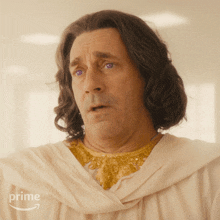
Catholic church recognizes 3 of the 7 Archangels: Gabriel, Michael and Raphael.
• Michael - Recognized by The Bible, the one who fought against Lucifer, chief of "The Army of Yahweh"
• Gabriel - The Celestial Messenger
• Raphael - Recognized by The Book of Tobit, The Healer of God
Another possible interpretation we have of The 7 Archangels is that these are the seven spirits of God who are before the throne described in the Book of Enoch and in the Book of Revelation (Rev 1:4, 3:1, 4:5, 5:6).
They are said to be the guardian angels of nations and countries, concerned with the issues and events surrounding them, including politics, military affairs, and commerce.
Ex. Archangel Michael is known for being the protector if Israel.

Examples of archangels are
• Raziel
• Camel
• Zadkiel
• Yahoel
• Cassiel
Aziraphale and his ranking
Neil just confirmed Aziraphale was a Cherub at the Garden of Eden. We can confirm this by the proximity to God and "upstairs" in ep 1.

"You know, the current word from upstairs is that we'll be shutting this all down again in about 6,000 years"
- Aziraphale (S2E1 03:05)
"Now that's [Earth] where people that we're currently designing are going to be. I've seen the plans".
- Aziraphale (S2E1 03:47)
Fun fact: Uriel (Fire of God) was the one with the flamming sword to avoid humans access to The Tree of Life (mention in The Book of Adam and Eve) and the one of warned Noah about the flood. I found very interesting that they chose Aziraphale in those parts.

In my previous post about Angelology, we see the ranks, a Cherub being in the 2nd chorus of the 1st rank and a Principality being in the 1st chorus of the 3rd rank.
So, in Christian Catholic Angelology, he got a demotion.
Muriel and their ranking
In season 2 we know that Muriel is 37th order scrivener.

Scriveners are actually in the bible, but they're not angels; basically, they copy manuscripts and other texts as well as secretarial and administrative duties, also they're the one whose occupation is to draw contracts or prepare writings, that's why we see Muriel doing the authenticity verification of the permit Crowley had in ep 2.

Ranking of angels
We have different ranking of angels depending on the religion, because each one might have the same name of the chorus (rank) but in different hierarchy (and also another type of ranks), it could be pretty confusing at some point. I personally follow the Christian Catholic Angelology.
I adore how they include Crowley and Aziraphale in biblical events, because based of their personalities it totally fit, which I think is pretty amazing.
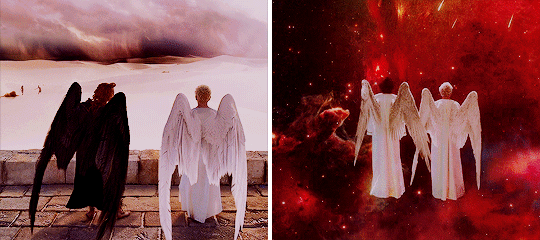
I hope my answer helped!
#good omens#ineffable husbands#aziraphale#crowley#gos2#good omens 2#aziracrow#good omens season 2#Angelology#Christian Catholic Angelology#season 2#Gabriel#Muriel#Angels
18 notes
·
View notes
Text
SAINTS OF THE DAY (September 29)

The three Archangels — Michael, Gabriel and Raphael — are the only angels named in Sacred Scripture and all three have important roles in the history of salvation.
Saint Michael is the "Prince of the Heavenly Host," the leader of all the angels.
His name is Hebrew for "Who is like God?" and was the battle cry of the good angels against Lucifer and his followers when they rebelled against God.
He is mentioned four times in the Bible — in Daniel 10 and 12, in the letter of Jude, and in Revelation.
Saint Michael, whose forces cast down Lucifer and the evil spirits into Hell, is invoked for protection against Satan and all evil.
In 1899, Pope Leo XIII, having had a prophetic vision of the evil that would be inflicted upon the Church and the world in the 20th century, instituted a prayer asking for Saint Michael's protection to be said at the end of every Mass.
Christian tradition recognizes four offices of Saint Michael:
(i) to fight against Satan;
(ii) to rescue the souls of the faithful from the power of the enemy, especially at the hour of death;
(iii) to be the champion of God's people;
(iv) to call away from earth and bring men's souls to judgment.
"I am Gabriel, who stand before God." (Luke 1, 19)
Saint Gabriel, whose name means "God's strength," is mentioned four times in the Bible.
Most significant are Gabriel's two mentions in the New Testament:
1) to announce the birth of John the Baptist to his father Zacharias;
2) the Incarnation of the Word in the womb of Mary.
Christian tradition suggests that it is he who appeared to St. Joseph and to the shepherds.
Additionally, it was he who "strengthened" Jesus during his agony in the garden of Gethsemane.
"I am the angel Raphael, one of the seven, who stand before the Lord" (Tob 12:15)
Saint Raphael's name means "God has healed" due to his healing of Tobias' blindness in the Book of Tobit.
Tobit is the only book in which he is mentioned.
His office is generally accepted by tradition to be that of healing and acts of mercy.
Raphael is also identified with the angel in John 5:1-4 who descended upon the pond and bestowed healing powers upon it so that the first to enter it after it moved would be healed of whatever infirmity he was suffering.
12 notes
·
View notes
Text
ah yes my favorite tobeysodes:
-when will yoiu learn!! when wilk youu leasrn!! that yuor actions have ConsEQEUNSES
-Baka Edns
-Toboinger goes okie doki
-Dpepretment stroe Toboboer
-Prinses trinaana and the... i forgor 💀
-Tobobobing's Mastetrpeic
-tober finsd remtoe wit his girlboss gf
-MAUSUEZILA!!!! NOT CLICKBAIT!!!
-Toijogbiingo's spoopy month
-the ultimate tobecky love day (cherish is the word who???)
-Wijn day wit girlbosss gf!!!! (tobey try no to simp challenge)
-w o r b o t
-the catastrophical event of the mechanical potato-powered giant metal creation
-TOBE MOUSE CLUBHOUSE DISASER
-yo mama so ROBIT
-bampy fite tobits 😭
-when the best clubhous meeting!!! 😳
-natsuiro egao de 1 2 jump gone wrong
-nerd emoji got talent 🤓
-the saemn sparklijgn smiel! 😍 teh smae ruby LIPS! 🔥 TNE SA-
-Go Gadget G- I mean NO GADGET NO WTF ARE YOU DOING STOP 😭
-it's ummm yo prty and uh ill cry of i wanna goofy ahh
-pachth gaem!!?1!
-THANKSGIVI
-Feidl daee funi wiuth the tobit
-rObit camp
-monke tobit super smash bros
-TOBEY TELLING T R U T H ! BOY GENIUSES NEVER TELL LIES-
#wordgirl#tobey mccallister#theodore tobey mccallister iii#stan tobey mccallister#tobey mccallister iii#stantobeymccallister#tobey mcallister#tobecky#tobey mcallister iii#tobecky forever#tobeckyforever#the fact that i memorized these off the top of my head 💀
22 notes
·
View notes
Text

Synaxis of the Archangel Michael and the Other Bodiless Powers
The Synaxis of the Chief of the Heavenly Hosts, Archangel Michael and the Other Heavenly Bodiless Powers: Archangels Gabriel, Raphael, Uriel, Selaphiel, Jehudiel, Barachiel, and Jeremiel was established at the beginning of the fourth century at the Council of Laodicea, which met several years before the First Ecumenical Council. The 35th Canon of the Council of Laodicea condemned and denounced as heretical the worship of angels as gods and rulers of the world, but affirmed their proper veneration.
A Feastday was established in November, the ninth month after March (with which the year began in ancient times) since there are Nine Ranks of Angels. The eighth day of the month was chosen for the Synaxis of all the Bodiless Powers of Heaven since the Day of the Dread Last Judgment is called the Eighth Day by the holy Fathers. After the end of this age (characterized by its seven days of Creation) will come the Eighth Day, and then “the Son of Man shall come in His Glory and all the holy Angels with Him” (Mt. 25:31).
Over all the Nine Ranks, the Lord appointed the Holy Archangel Michael (his name in Hebrew means “who is like unto God”), the faithful servitor of God, as Chief Commander. He cast down from Heaven the arrogantly proud Lucifer and the other fallen spirits when they rebelled against God. Michael summoned the ranks of angels and cried out, “Let us attend! Let us stand aright before our Creator and do not consider doing what is displeasing unto God!”
Holy Scripture and Tradition give us the names of the Archangels:
Gabriel: strength (power) of God, herald and servitor of Divine omnipotence (Dan 8:16, Luke 1:26). He announces the mysteries of God.
Raphael: the healing of God, the curer of human infirmities (Tobit 3:16, 12:15)
Uriel: the fire or light of God, enlightener (2 Esdras 5:20). We pray for him to enlighten those with darkened minds.
Selaphiel: the prayer of God, impelling to prayer (2 Esdras 5:15). He prays to God for mankind.
Jehudiel: the glorifying of God, encouraging exertion for the glory of the Lord and interceding for the reward of efforts.
Barachiel: distributor of the blessings of God for good deeds, entreats the mercy of God for people.
Jeremiel: the raising up to God (2 Esdras 4:36)
[Source]
8 notes
·
View notes
Text
How many books are in your Bible?
Somehow I ended up on the Wikipedia page for Biblical canon and now my head hurts so I'm throwing all of you into the rabbit hole with me.
All Christian denominations share the same twenty-seven books of the New Testament: Matthew, Mark, Luke, John, Acts, Romans, 1 and 2 Corinthians, Galatians, Ephesians, Philippians, Colossians, 1 and 2 Thessolonians, 1 and 2 Timothy, Titus, Philemon, Hebrews, James, 1 and 2 Peter, 1 2 and 3 John, Jude, and Revelation. (The Orthodox Tewahedo Church has an additional eight books, but they are not considered part of the Bible itself, just the broader religious canon.)
However, the Old Testament is where it gets complicated.
The Tanakh contains twenty four books divided into three sections: The Torah, the Nevi'im, and the Ketuvim. The Torah contains Genesis, Exodus, Leviticus, Numbers, and Deuteronomy. The Nevi'im contains Joshua, Judges, Samuel, Kings, Isaiah, Jeremiah, Ezekiel, Hosea, Joel, Amos, Obadiah, Jonah, Micah, Nahum, Habakkuh, Zephaniah, Haggai, Zechariah, and Malachi. The Ketuvim contains Psalms, Proverbs, Job, Ruth, Lamentations, Ecclesiastes, Esther, Daniel, Ezra and Nehemiah, and Chronicles.
The Protestant Old Testament took the canon of the Tanakh, divided some books into two and added another book, making a total of 39 books: Genesis, Exodus, Leviticus, Numbers, Deuteronomy, Joshua, Judges, Ruth, 1 and 2 Samuel, 1 and 2 Kings, 1 and 2 Chronicle, Ezra, Nehemiah, Esther, Job, Psalms, Proverbs, Ecclesiastes, Song of Solomon (also called Song of Songs), Isaiah, Jeremiah, Lamentations, Ezekiel, Daniel, Hosea, Joel, Amos, Obadiah, Jonah, Micah, Nahum, Habakkuh, Zephaniah, Haggai, Zechariah, and Malachi. Combing the Old and New Testaments, Protestant Bibles have 66 books.
The Catholic Bible includes the same 39 books as the Protestant Bible, with an additional seven books called the Deuterocanon: Tobit, Judith, Baruch, Sirach, 1 and 2 Maccabees, and Wisdom. Additionally, the books Esther and Daniel in the Catholic Bible contain more text than their Protestant counterparts. In total, the Catholic Bible has 73 books, 46 of those being the Old Testament.
The Greek Orthodox Bible includes the 46 books of the Catholic Old Testament, with an additional three: Prayer of Manasseh, 1 Esdras, and 3 Maccabees. Also, while the Protestant and Catholic Bibles contain 150 Psalms, the Greek Orthodox has 151. In total, the Greek Orthodox Bible contains 76 books.
The Slavonic Orthodox and Georgian Orthodox Bibles contain the same books as the Greek Orthodox.
The Armenian Apostolic Bible contains 50 Old Testament books: The 49 books in the Greek Orthodox Bible, and one other: 2 Esdras. This Bible contains Psalm 151. The Armenian Apostolic Bible contains 77 total books.
The Syrian Orthodox Old Testament has 48 books: All the books of the Catholic Old Testament with the additions of Prayer of Manasseh and 3 Maccabees. This Bible contains Psalm 151. The Syrian Orthodox Bible contains 75 total books.
The Coptic Orthodox Bible has 47 Old Testament books: All the books of the Catholic Old Testament with Prayer of Manasseh added. This Bible contains Psalm 151. The Coptic Orthodox Bible contains 74 books.
The Orthodox Tewahedo Bible is the canon for both the Ethiopian Orthodox Tewahedo Church and the Eritrean Orthodox Tewahedo Church. This Bible has the 39 Protestant Old Testament Books, and the additional books Jubilees, Enoch, Meqabyan, Ezra Sutuel, Tobith, and Judith. This Bible contains Psalm 151, and the books 2 Chronicles and Jeremiah are extended. The Orthodox Tewahedo Bible contains 73 books.
The Assyrian Church of the East has the 46 books of the Catholic Old Testament, plus two: Prayer of Manasseh and 3 Macabees. This Bible contains Psalm 151, and Baruch is extended. The Assyrian Church of the East Bible contains 75 books.
I hope this information serves you well if you ever end up on Who Wants to Be a Millionaire or something one day
25 notes
·
View notes
Text
sorry i’m posting what i think everyone has figured out already but the part about hythlodaeus and morus does not appear to refer to the final fantasy characters - it would make more sense that it refers to character’s from more’s ‘utopia’. some random reference i found on this is copy and pasted below:
“RAPHAEL HYTHLODAEUS is the protagonist in St. Thomas More's Utopia, and his discussions with More in this hard-to-place work fits in with the notion of Lyotard's notion of "differend." In Book 1 of More's Utopia, the groundwork is set for the philosophical discourse in Book 2. Book 1 is largely composed of a dialogue between Morus (the Latin name for "More") and his friend Peter Giles and a traveler named Raphael Hythlodaeus. The name Hythlodaeus is derived from Greek, from a combination of hythlos (idle talk or nonsense) and daiein (distributor). Hythlodaeus is therefore a sower of nonsense, a buffoon. Hythlodaeus' first name, Raphael, is obviously refers to the Biblical archangel, Raphael (רָפָאֵל), the meaning of which is "It is God (El) who heals." Raphael is "one of the seven, who stand before the Lord," Tobit 12:15, and he is regarded as the angelicus medicus, the healing angel. It is Raphael who, in the deuterocanonical book of Tobit, advises Tobias to catch a fish and use its liver to cure his father Tobit of his blindness.” - some ‘not secure’ blogspot page from lex christianorum apparently
peter giles hm. giles.
#drdt#drdt theory#drdt mv#david mv#david chiem#sorry for using tags#i just need the memories bot to get a clue bc the whole tumbeasts coppy stuff is cringe#i feel like captain obvious#does everyone know this already??#am i behind
6 notes
·
View notes
Text
Previously, on Apocrypals part 5: The Fifth One
As we begin our sixth (!) calendar year of Apocrypals, here is a list of the texts we have covered so far on the show in case you want to read along or catch up. They’re arranged in a way that appeases my systematic nature.
Tanakh/Old Testament:
Genesis (episodes 16-20)
Exodus (episodes 33 and 35)
Leviticus (episode 59)
Numbers (episode 62)
Deuteronomy (episode 65)
Joshua (episode 73)
Judges (episode 80)
Ruth (episode 45)
1 Samuel (episode 89)
2 Samuel (episode 90-91)
1 Kings (episode 99)
2 Kings (episode 106)
Esther (episode 37)
Job (episode 101)
Ecclesiastes (episode 52)
Song of Songs (episode 34)
Isaiah (episode 4)
Jeremiah (episode 43-44)
Lamentations (episode 48)
Ezekiel (episode 55-56)
Daniel (episode 2)
Hosea (episode 108)
Jonah (episode 31)
Micah (episode 74)
Nahum (episode 74)
Deuterocanon/capital-A Apocrypha:
Tobit (episode 13)
Judith (episode 22)
Greek Additions to Esther (episode 37)
1 Maccabees (episode 27)
2 Maccabees (episode 28)
3 Maccabees (episode 53)
4 Maccabees (episode 78)
The Prayer of Azariah aka the Song of the Three Holy Children (episode 2)
Susanna (episode 2)
Bel and the Dragon (episode 2)
The Prayer of Manasseh (episode 6)
New Testament:
Matthew (episodes 8-9)
Mark (episode 7)
Luke (episode 10)
John (episode 11-12)
Acts of the Apostles (episode 1)
Romans (episode 5)
1 Corinthians (episode 25)
2 Corinthians (episode 42)
Galatians (episode 72)
Ephesians (episode 81)
Hebrews (episode 104)
1 John (episode 49)
2 John (episode 49)
3 John (episode 49)
Revelation (episode 50)
Pseudepigrapha (Jewish apocrypha):
The Testament of Solomon (episode 24)
The Story of Ahikar (episode 14)
The Ascension of Isaiah (episode 6)
1 Enoch (episode 39-40)
2 Enoch (episode 61)
3 Enoch (episode 86-87)
Jubilees (episodes 82 and 83)
The Letter of Aristeas (episode 70)
The War of the Sons of Light Against the Sons of Darkness (episode 71)
Joseph and Aseneth (episode 93)
New Testament apocrypha:
The Protevangelium aka Infancy Gospel of James (episode 29)
The Acts of Pilate/Gospel of Nicodemus (episode 23)
Mors Pilati/Death of Pilate (episode 23)
The Acts of Paul and Thecla (episode 22)
The Acts of Peter (episode 3)
The Acts of Peter and Paul (episode 3)
The Acts of Andrew and Matthias (episode 60)
The Acts of Thomas and His Wonderworking Skin (episode 66)
The Life of Xanthippe, Polyxena, and Rebecca (episode 57)
Questions of Bartholomew (episode 41)
Resurrection of Jesus Christ by Bartholomew (episode 41)
The Book of Bartholomew (episode 67)
Acts of John (episode 46)
The Acts of Andrew (episode 97)
Syriac Infancy Gospel (episode 47)
Infancy Gospel of Thomas (episode 54)
Infancy Gospel of Pseudo-Matthew (episode 79)
The Adoration of the Magi (2020 Christmas bonus episode)
The History of Joseph the Carpenter (episode 103)
The First Apocryphal Apocalypse of John (episode 68)
The Second Apocryphal Apocalypse of John (episode 68)
The Third Apocryphal Apocalypse of John (episode 68)
The Apocalypse of Peter (episode 75)
The Apocalypse of Paul (episode 95)
The Gospel of Philip (episode 92)
The Gospel of Mary (episode 92)
The Gospel of Jesus’s Wife (episode 92)
The Gospel of Judas (episode 100)
The Greater Questions of Mary (episode Secret 69)
The Golden Legend of Jacobus de Voragine:
The Life of Saint Nicholas (episode 26)
The Life of Saint Lucy (episode 26)
The Life of Saint Christopher (episode 15)
The Life of Saint Benedict (episode 15)
excerpts from The Passion of the Lord (episode 23)
The Life of Saint Sebastian (episode 58)
The Life of Saint Blaise (episode 58)
The Life of Saint Agatha (episode 58)
The Life of Saint Roch (episode 63)
The Life of Saint Catherine of Alexandria (episode 77)
The Life of Saint Barbara (episode 77)
The Life of Saint Dunstan (episode 85)
The Life of Mary Magdalene (episode 94)
The Life of Saint Martha of Bethany (episode 102)
The Life of Saint Margaret of Antioch (episode 102)
Other:
Historia Trium Regum/The Legend of the Three Kings by John of Hildesheim (episode 30)
Muirchu’s Life of Saint Patrick (episode 36)
The Life of Saint Guinefort (episode 63)
The Life of Saint Mary of Egypt (episode 69)
The Life of Saint Pelagia (episode 69)
The Life of Saint Martin by Sulpicius Severus (episode 76)
The Life of Saint Columba (episode 84)
The Life of Saint Wilgefortis (episode 94)
Lives of cephalophoric saints (bonus episode cephalo4)
Stories of the Baal Shem Tov from The Golden Mountain (episode 96)
More stories of the Baal Shem Tov from The Golden Mountain (episode 107)
Solomon and Ashmedai (bonus episode double chai)
Listener questions (episode 32)
Bible trivia questions (episode 38)
Halloween-themed Chick tracts (episode 51)
Christmas-themed Chick tracts (episode 98)
Bible Adventures and the Wisdom Tree catalogue of video games (episode 64)
The Da Vinci Code, the movie (episode 88)
Guess the Bible character from Persona 5 (bonus episode Persona 5)
El Shaddai: Ascension of the Metatron (episode 105)
You can find links to all these episodes with show notes and more on the Apocrypals wiki
#apocrypals#podcast#podcasts#religion#bible#christianity#judaism#apocrypha#old testament#new testament#hagiography
88 notes
·
View notes
Text
Saints&Reading: Monday, November 21, 2022. All we need to know about angels
november 21_november 9
SYNAXIS OF THE ARCHANGEL GABRIEL AND THE OTHER BODILESS POWERS

We invoke Saint Michael for protection from invasion by enemies and from civil war, and for the defeat of adversaries on the field of battle. He conquers all spiritual enemies. Michael tramples the devil underfoot, and in his left hand holds a green date-tree branch, and in his right hand a spear with a white banner on which is outlined a scarlet cross, or sometimes a fiery sword.
The Synaxis of the Chief of the Heavenly Hosts, Archangel Michael and the Other Heavenly Bodiless Powers: Archangels Gabriel, Raphael, Uriel, Selaphiel, Jehudiel, Barachiel, and Jeremiel was established at the beginning of the fourth century at the Council of Laodicea, which met several years before the First Ecumenical Council. The 35th Canon of the Council of Laodicea condemned and denounced as heretical the worship of angels as gods and rulers of the world, but affirmed their proper veneration.
A Feastday was established in November, the ninth month after March (with which the year began in ancient times) since there are Nine Ranks of Angels. The eighth day of the month was chosen for the Synaxis of all the Bodiless Powers of Heaven since the Day of the Dread Last Judgment is called the Eighth Day by the holy Fathers. After the end of this age (characterized by its seven days of Creation) will come the Eighth Day, and then “the Son of Man shall come in His Glory and all the holy Angels with Him” (Mt. 25:31).
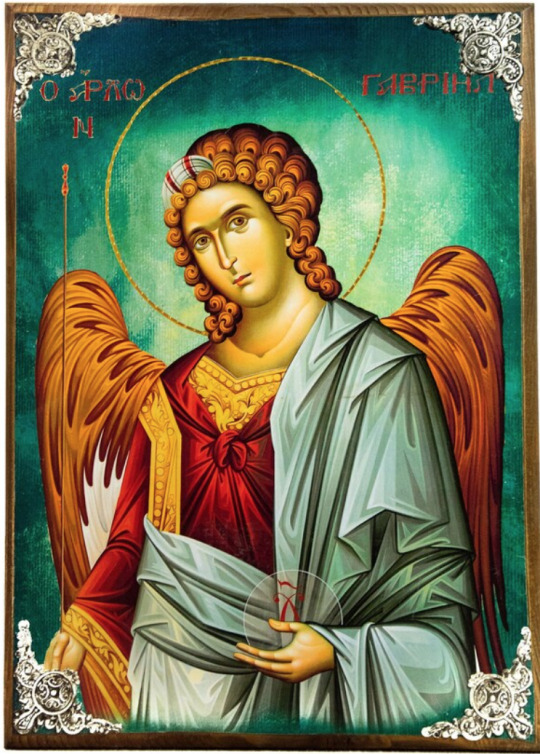
Gabriel: strength (power) of God, herald and servitor of Divine omnipotence (Dan 8:16, Luke 1:26). He announces the mysteries of God. abriel with a branch from Paradise, presented by him to the Most Holy Virgin, or with a shining lantern in his right hand and with a mirror made of jasper in his left.
The Angelic Ranks are divided into three Hierarchies: highest, middle, and lowest.
The Highest Hierarchy includes: the Seraphim, Cherubim and Thrones.
The six-winged SERAPHIM (Flaming, Fiery) (Is 6:2) stand closest of all to the Most Holy Trinity. They blaze with love for God and kindle such love in others.
The many-eyed CHERUBIM (outpouring of wisdom, enlightenment) (Gen 3:24) stand before the Lord after the Seraphim. They are radiant with the light of knowledge of God, and knowledge of the mysteries of God. Through them wisdom is poured forth, and people’s minds are enlightened so they may know God and behold His glory.
The THRONES (Col 1:16) stand after the Cherubim, mysteriously and incomprehensibly bearing God through the grace given them for their service. They are ministers of God’s justice, giving to tribunals, kings, etc. the capacity for righteous judgment.
The Middle Angelic Hierarchy consists of three Ranks: Dominions, Powers, and Authorities:
DOMINIONS (Col 1:16) hold dominion over the angels subject to them. They instruct the earthly authorities, established by God, to rule wisely, and to govern their lands well. The Dominions teach us to subdue sinful impulses, to subject the flesh to the spirit, to master our will, and to conquer temptation.

Raphael: the healing of God, the curer of human infirmities (Tobit 3:16, 12:15). holds a vessel with healing medications in his left hand, and with his right hand leads Tobias, carrying a fish for healing (Tobit 5-8).
POWERS (1 Pet 3:22) fulfill the will of God without hesitation. They work great miracles and give the grace of wonderworking and clairvoyance to saints pleasing to God. The Powers assist people in fulfilling obediences. They also encourage them to be patient, and give them spiritual strength and fortitude.
AUTHORITIES (1 Pet 3:22, Col 1:16) have authority over the devil. They protect people from demonic temptations, and prevent demons from harming people as they would wish. They also uphold ascetics and guard them, helping people in the struggle with evil thoughts.

Uriel: the fire or light of God, enlightener (2 Esdras 5:20). We pray for him to enlighten those with darkened minds. Uriel in his raised right hand holds a naked sword at the level of his chest, and in his lowered left hand “a fiery flame.

Selaphiel: the prayer of God, impelling to prayer (2 Esdras 5:15). He prays to God for mankind. Selaphiel in a prayerful posture, gazing downwards, hands folded on the chest.

Jehudiel: the glorifying of God, encouraging exertion for the glory of the Lord and interceding for the reward of efforts. Jehudiel holds a golden crown in his right hand, in his left, a whip of three red (or black) thongs.

Barachiel: distributor of the blessings of God for good deeds, entreats the mercy of God for people. Barachiel is shown with a white rose on his breast.
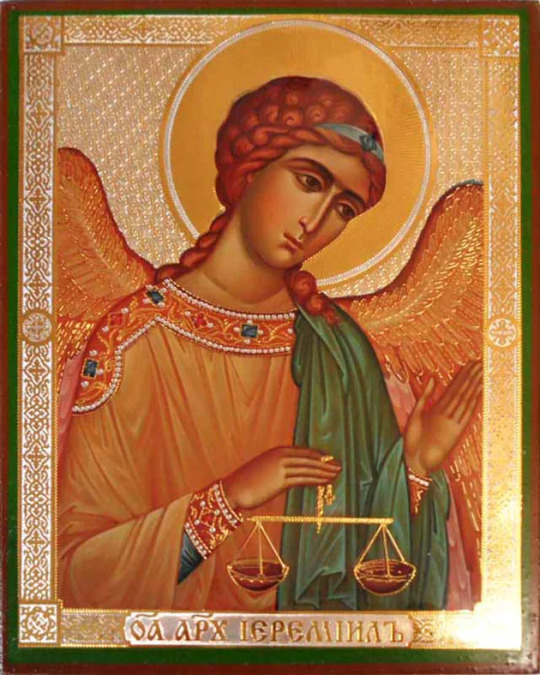
Jeremiel: the raising up to God (2 Esdras 4:36).Jeremiel holds balance-scales in his hand
Iconography:
The Archangels are depicted according to the character of their service.
Ranks
The Lowest Hierarchy includes the three Ranks: Principalities, Archangels, and Angels:
PRINCIPALITIES (Col 1:16) have command over the lower angels, instructing them in the fulfilling of God’s commands. They watch over the world and protect lands, nations and peoples. Principalities instruct people to render proper honor to those in authority, as befits their station. They teach those in authority to use their position, not for personal glory and gain, but to honor God, and to spread word of Him, for the benefit of those under them.
ARCHANGELS (1 Thess 4:16) are messengers of great and wondrous tidings. They reveal prophecies and the mysteries of the faith. They enlighten people to know and understand the will of God, they spread faith in God among the people, illuminating their minds with the light of the Holy Gospel.
ANGELS (1 Pet 3:22) are in the lowest rank of the heavenly hierarchy, and closest to people. They reveal the lesser mysteries of God and His intentions, guiding people to virtuous and holy life. They support those who remain steadfast, and they raise up the fallen. They never abandon us and they are always prepared to help us, if we desire it.
All the Ranks of the Heavenly Powers are called angels, although each has its own name and position by virtue of their service. The Lord reveals His will to the highest ranks of the angels, and they in turn inform the others.
Over all the Nine Ranks, the Lord appointed the Holy Archangel Michael (his name in Hebrew means “who is like unto God”), the faithful servitor of God, as Chief Commander. He cast down from Heaven the arrogantly proud Lucifer and the other fallen spirits when they rebelled against God. Michael summoned the ranks of angels and cried out, “Let us attend! Let us stand aright before our Creator and do not consider doing what is displeasing unto God!
According to Church Tradition, and in the church services to the Archangel Michael, he participated in many other Old Testament events.
During the Exodus of the Israelites from Egypt he went before them in the form of a pillar of cloud by day and a pillar of fire by night. Through him the power of the Lord was made manifest, annihilating the Egyptians and Pharaoh who were in pursuit of the Israelites. The Archangel Michael defended Israel in all its misfortunes.
He appeared to Joshua Son of Navi and revealed the will of the Lord at the taking of Jericho (Josh 5:13-16). The power of the great Chief Commander of God was manifest in the annihilation of the 185,000 soldiers of the Assyrian emperor Sennacherib (4/2 Kings 19:35); also in the smiting of the impious leader Heliodorus (2 Macc. 3: 24-26); and in the protection of the Three Holy Youths: Ananias, Azarias and Misail, thrown into the fiery furnace for their refusal to worship an idol (Dan 3:22-25).
Through the will of God, the Chief Commander Michael transported the Prophet Habbakuk (December 2) from Judea to Babylon, to give food to Daniel in the lions’ den (Dan. 14:33-37).
The Archangel Michael disputed with the devil over the body of the holy Prophet Moses (Jude 1:9).
The holy Archangel Michael showed his power when he miraculously saved a young man, cast into the sea by robbers with a stone about his neck on the shores of Mt Athos. This story is found in the Athonite Paterikon, and in the Life of Saint Neophytus of Docheiariou (November 9).
From ancient times the Archangel Michael was famed for his miracles in Rus. In the Volokolamsk Paterikon is a narrative of Saint Paphnutius of Borov with an account of Tatar tax-gatherers concerning the miraculous saving of Novgorod the Great: “Therefore Great Novgorod was never taken by the Hagarenes... when... for our sins the godless Hagarene emperor Batu devoured and set the Russian land aflame and came to Novgorod, and God and the Most Holy Theotokos shielded it with an appearance of Michael the Archangel, who forbade him to enter into it. He [Batu] was come to the Lithuanian city and came toward Kiev and saw the stone church, over the doors of which the great Archangel Michael had written and spoken to the prince his allotted fate, ‘By this we have forbidden you entry into Great Novgorod’.”
Intercession for Russian cities by the Most Holy Queen of Heaven always involved Her appearances with the Heavenly Hosts, under the leadership of the Archangel Michael. Grateful Rus acclaimed the Most Pure Mother of God and the Archangel Michael in church hymns. Many monasteries, cathedrals, court and merchant churches are dedicated to the Chief Commander Michael.
In old Kiev at the time of the accepting of Christianity, a cathedral of the Archangel was built, and a monastery also was named for him. Archangel cathedrals are found at Smolensk, Nizhni Novgorod, Staritsa, at Great Ustiug (beginning of the thirteenth century), and a cathedral at Sviyazhsk. In Rus there was not a city where there was not a church or chapel dedicated to the Archangel Michael.
One of the chief temples of the city of Moscow, the burial church in the Kremlin, is dedicated to him. Numerous and beautiful icons of the Chief Commander of the Heavenly Hosts are also in his Cathedral. One of these, the Icon “Blessed Soldiery,” was painted in the Dormition Cathedral of the Moscow Kremlin. The saintly soldiers, Russian princes, are depicted under the leadership of the Archangel Michael.
Each person has a guardian angel (Matt 18:10), and every nation also receives its own guardian angel from God (Dan. 10:13). When a church is consecrated, it also receives a guardian angel (Palladius, Dial. Ch. 10).
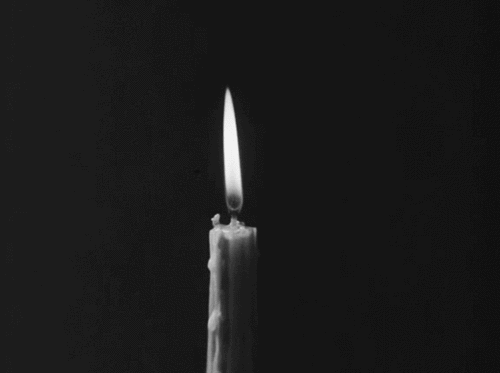
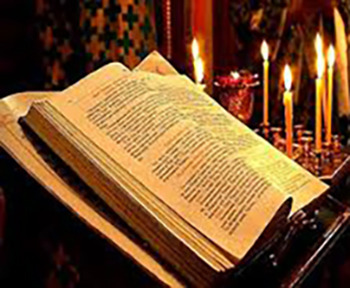
LUKE 10:16-21
16 He who hears you hears Me, he who rejects you rejects Me, and he who rejects Me rejects Him who sent Me. 17 Then the seventy returned with joy, saying, "Lord, even the demons are subject to us in Your name." 18 And He said to them, "I saw Satan fall like lightning from heaven. 19 Behold, I give you the authority to trample on serpents and scorpions, and over all the power of the enemy, and nothing shall by any means hurt you. 20 Nevertheless do not rejoice in this, that the spirits are subject to you, but rather rejoice because your names are written in heaven. 21 In that hour Jesus rejoiced in the Spirit and said, "I thank You, Father, Lord of heaven and earth, that You have hidden these things from the wise and prudent and revealed them to babes. Even so, Father, for so it seemed good in Your sight.
Commentary of the Church Fathers
Clement of Alexandria AD 215: After we have repented of our sins, renounced our wickedness, and have been purified by baptism, we turn back to the eternal light, as children to their Father. “Rejoicing in the spirit, Jesus said, ‘I praise you, Father, God of heaven and earth, that you have hidden these things from the wise and prudent, and revealed them to little ones.’ ” The Educator and Teacher is naming us “little ones,” meaning that we are more ready for salvation than the worldly wise who, believing themselves wise, have blinded their own eyes. He cries out in joy and in great delight, as if attuning himself to the spirit of the little ones, “Yes, Father, for such was your good pleasure.” That is why he has revealed to little ones what has been hid from the wise and prudent of this world.
HEBREWS 2:2-10
2 For if the word spoken through angels proved steadfast, and every transgression and disobedience received a just reward, 3 how shall we escape if we neglect so great a salvation, which at the first began to be spoken by the Lord, and was confirmed to us by those who heard Him, 4 God also bearing witness both with signs and wonders, with various miracles, and gifts of the Holy Spirit, according to His own will? 5 For He has not put the world to come, of which we speak, in subjection to angels. 6 But one testified in a certain place, saying:"What is man that You are mindful of him, Or the son of man that You take care of him? 7 You have made him a little lower than the angels; You have crowned him with glory and honor, And set him over the works of Your hands. 8 You have put all things in subjection under his feet." For in that He put all in subjection under him, He left nothing that is not put under him. But now we do not yet see all things put under him.9 But we see Jesus, who was made a little lower than the angels, for the suffering of death crowned with glory and honor, that He, by the grace of God, might taste death for everyone.10 For it was fitting for Him, for whom are all things and by whom are all things, in bringing many sons to glory, to make the captain of their salvation perfect through sufferings.
Commentary of the Church Father
John Chrysostom AD 407 Now although these things were spoken of human nature generally, they would nevertheless apply more properly to Christ according to the flesh. For this, You have put all things in subjection under his feet, belongs to Him rather than to us. For the Son of God visited us when we were nothing: and after having assumed our [nature], and united it to Himself, He became higher than all. For, he says, in that He has put all things in subjection under Him, He left nothing not put under Him: but now we see not yet all things put under Him. What he means is this:— since he had said, Until I make Your enemies Your footstool Hebrews 1:13—and it was likely that they would still be grieved—then having inserted a few things after this parenthetically, he added this testimony in confirmation of the former. For that they might not say, How is it that He has put His enemies under His feet, when we have suffered so much? He sufficiently hinted at it in the former place indeed (for the word until showed, not what should take place immediately, but in course of time) but here he follows it up. For do not suppose (he says) that because they have not yet been made subject, they are not to be made subject: for that they must be made subject, is evident; for, on this account was the prophecy spoken. For, he says, in that He has put all things under Him, He left nothing not put under Him. How then is it that all things have not been put under Him? Because they are hereafter to be put under Him. If then all things must be made subject to Him, but have not yet been made subject, do not grieve, nor trouble yourself. If indeed when the end had come, and all things were made subject, thou were still suffering these things, with reason would you repine: But now we see not yet all things put under Him. The King has not yet clearly conquered. Why then are you troubled when suffering affliction? The preaching [of the Gospel] has not yet prevailed over all; it is not yet time that they should be altogether made subject.
#orthodoxy#orthodoxchristianity#easternchristianity#originofchristianity#spirituality#holyscriptures#gospel#bible#wisdom
9 notes
·
View notes